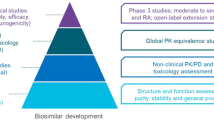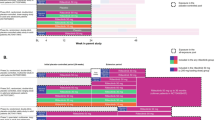Abstract
Introduction
Adalimumab (ADA) is a medication used in the treatment of several autoimmune diseases. Despite the beneficial effects of ADA, its adherence and persistence rates are low. Patients treated with ADA from Clalit Health Services (CHS) can enroll in AbbVie’s patient support program (PSP), which aims to improve ADA adherence and persistence. Therefore, we examine whether PSP participation is associated with a longer persistence and/or an improved adherence to ADA.
Methods
A real-world retrospective cohort study of all new ADA users from CHS, comparing those enrolled in the offered PSP to those not enrolled. The data regarding PSP users can be tracked using CHS’s data warehouse. The index date was defined as the date of the patients’ first purchase of ADA occurring between August 1, 2012 and December 31, 2014. The follow-up data were collected at 12, 24, and 36 months. Persistence was assessed using survival analyses of time until discontinuation, and adherence was assessed using medication possession ratio (MPR).
Results
There were 1520 patients in the study, 755 (49.7%) of whom were PSP users. PSP users were 54.3% female vs. 51.9% among non-PSP users (p = 0.355) and they were significantly younger than non-PSP users (mean age 42.3 vs. 45.0 years, p = 0.002) The PSP and non-PSP users’ persistence was 673 and 574 days, respectively (p < 0.001). Further, the PSP users were more likely than the non-PSP users to be persistently taking medication at the 12-month follow-up (57.5% vs. 45.6%, p < 0.001). The 12-month mean adherence rate among those with at least 12 months of persistence was significantly improved for the PSP users compared to the non-PSP users (94.1% vs. 92.9%, p = 0.026).
Conclusion
The AbbVie PSP provided to CHS patients was associated with a longer persistence among new users of ADA. It was also associated with significantly higher adherence rate within the first 12 months.
Funding
AbbVie Inc.


Similar content being viewed by others
References
Lorenz HM. Technology evaluation: adalimumab, Abbott laboratories. Curr Opin Mol Ther. 2002;4(2):185–90.
Bonovas S, Minozzi S, Lytras T, et al. Risk of malignancies using anti-TNF agents in rheumatoid arthritis, psoriatic arthritis, and ankylosing spondylitis: a systematic review and meta-analysis. Expert Opin Drug Saf. 2016;15(sup1):35–54.
Dziechciarz P, Horvath A, Kierkus J. Efficacy and safety of adalimumab for paediatric Crohn’s disease: a systematic review. J Crohns Colitis. 2016;10(10):1237–44.
Hernandez MV, Sanmarti R, Canete JD. The safety of tumor necrosis factor-alpha inhibitors in the treatment of rheumatoid arthritis. Expert Opin Drug Saf. 2016;15(5):613–24.
Zhang ZM, Li W, Jiang XL. Efficacy and safety of adalimumab in moderately to severely active cases of ulcerative colitis: a meta-analysis of published placebo-controlled trials. Gut Liver. 2016;10(2):262–74.
Jansen JP, Buckley F, Dejonckheere F, Ogale S. Comparative efficacy of biologics as monotherapy and in combination with methotrexate on patient reported outcomes (PROs) in rheumatoid arthritis patients with an inadequate response to conventional DMARDs–a systematic review and network meta-analysis. Health Qual Life Outcomes. 2014;12(1):102.
Korkosz M, Gąsowski J, Surdacki A, et al. Disparate effects of anti-TNF-α therapies on measures of disease activity and mediators of endothelial damage in ankylosing spondylitis. Pharmacol Rep. 2013;65(4):891–7.
Park KT, Sin A, Wu M, Bass D, Bhattacharya J. Utilization trends of anti-TNF agents and health outcomes in adults and children with inflammatory bowel diseases: a single-center experience. Inflamm Bowel Dis. 2014;20(7):1242–9.
Yu AP, Johnson S, Wang ST, et al. Cost utility of adalimumab versus infliximab maintenance therapies in the United States for moderately to severely active Crohn’s disease. Pharmacoeconomics. 2009;27(7):609–21.
Osterberg L, Blaschke T. Adherence to medication. N Engl J Med. 2005;353(5):487–97.
Fidder HH, Singendonk M, van der Have M, Oldenburg B, van Oijen M. Low rates of adherence for tumor necrosis factor-α inhibitors in Crohn’s disease and rheumatoid arthritis: results of a systematic review. World J Gastroenterol. 2013;19(27):4344–50.
Vangeli E, Bakhshi S, Baker A, et al. A systematic review of factors associated with non-adherence to treatment for immune-mediated inflammatory diseases. Adv Ther. 2015;32(11):983–1028.
Jacobi A, Rustenbach SJ, Augustin M. Comorbidity as a predictor for drug survival of biologic therapy in patients with psoriasis. Int J Dermatol. 2016;55(3):296–302.
Jorgensen TS, Kristensen LE, Christensen R, et al. Effectiveness and drug adherence of biologic monotherapy in routine care of patients with rheumatoid arthritis: a cohort study of patients registered in the Danish biologics registry. Rheumatology (Oxford). 2015;54(12):2156–65.
Chu L, Kawatkar AA, Gabriel SE. Medication adherence and attrition to biologic treatment in rheumatoid arthritis patients. Clin Ther 2015;37(3):660–666. e8.
Fisher A, Bassett K, Wright JM, Brookhart MA, Freeman H, Dormuth CR. Comparative persistence of the TNF antagonists in rheumatoid arthritis–a population-based cohort study. PLoS One. 2014;9(8):e105193.
Oladapo A, Barner JC, Lawson KA, et al. Medication effectiveness with the use of tumor necrosis factor inhibitors among Texas Medicaid patients diagnosed with rheumatoid arthritis. J Manag Care Spec Pharm. 2014;20(7):657–67.
Santoleri F, Sorice P, Lasala R, Rizzo RC, Costantini A. Medication adherence and persistence in the treatment of rheumatoid arthritis with adalimumab and etanercept. Six years of analysis. J Med Econ. 2014;17(5):320–5.
Bonafede M, Fox KM, Watson C, Princic N, Gandra SR. Treatment patterns in the first year after initiating tumor necrosis factor blockers in real-world settings. Adv Ther. 2012;29(8):664–74.
Chastek B, Fox KM, Watson C, Gandra SR. Etanercept and adalimumab treatment patterns in psoriatic arthritis patients enrolled in a commercial health plan. Adv Ther. 2012;29:691–7.
Markenson JA, Gibofsky A, Palmer WR, et al. Persistence with anti-tumor necrosis factor therapies in patients with rheumatoid arthritis: observations from the RADIUS registry. J Rheumatol. 2011;38(7):1273–81.
Thaci D, Ortonne JP, Chimenti S, et al. A phase IIIb, multicentre, randomized, double-blind, vehicle-controlled study of the efficacy and safety of adalimumab with and without calcipotriol/betamethasone topical treatment in patients with moderate to severe psoriasis: the BELIEVE study. Br J Dermatol. 2010;163(2):402–11.
Kaneko A, Hirano Y, Fujibayashi T, et al. Twenty-four-week clinical results of adalimumab therapy in Japanese patients with rheumatoid arthritis: retrospective analysis for the best use of adalimumab in daily practice. Mod Rheumatol. 2013;23(3):466–77.
Burudpakdee C, Khan ZM, Gala S, Nanavaty M, Kaura S. Impact of patient programs on adherence and persistence in inflammatory and immunologic diseases: a meta-analysis. Patient Prefer Adherence. 2015;11(9):435–48.
West C, Narahari S, O’Neill J, et al. Adherence to adalimumab in patients with moderate to severe psoriasis. Dermatol Online J. 2013;19(5):18182.
Van den Bosch F, Ostor AJK, Wassenberg S, et al. Erratum to: Impact of participation in the adalimumab (Humira) patient support program on rheumatoid arthritis treatment course: results from the PASSION study. Rheumatol Ther. 2017;4:97.
van Den Bosch F, Wassenberg S, Östör A, Varothai NA, Garg V, Kalabic J. Impact of participation in adalimumab patient support program (PSP) on clinical outcomes and predictors of psp utilization among patients with rheumatoid arthritis. Arthritis Rheumatol. 2015;67:1632–3.
Rubin DT, Mittal M, Davis M, Johnson S, Chao J, Skup M. Impact of a patient support program on patient adherence to adalimumab and direct medical costs in Crohn’s disease, ulcerative colitis, rheumatoid arthritis, psoriasis, psoriatic arthritis, and ankylosing spondylitis. J Manag Care Spec Pharm. 2017;23:859–67.
Cramer JA, Roy A, Burrell A, et al. Medication compliance and persistence: terminology and definitions. Value Health. 2008;11(1):44–7.
Tkacz J, Ellis L, Bolge SC, Meyer R, Brady BL, Ruetsch C. Utilization and adherence patterns of subcutaneously administered anti-tumor necrosis factor treatment among rheumatoid arthritis patients. Clin Ther. 2014;36(5):737–47.
Singer SR, Hoshen M, Shadmi E, et al. EMR-based medication adherence metric markedly enhances identification of nonadherent patients. Am J Manag Care. 2012;18(10):e372–7.
R Core Team. R: A language and environment for statistical computing. R Foundation for Statistical Computing, Vienna; 2013.
Levy AR, Teich V, Fernandes R, Gulart A, Chaves L, Garg V, Skup M. Patient support program for adalimumab-treated patients in Brazil: impact on patients’ adherence and persistence. Arthritis Rheumatol. 2016;68(suppl 10). http://acrabstracts.org/abstract/patientsupport-program-for-adalimumab-treated-patients-in-brazil-impact-on-patients-adherence-and-persistence/. Accessed 4 May 2018.
Acknowledgements
Funding
Design, study conduct, and financial support for the study were provided by AbbVie Inc. The Clalit Research Institute funds the article processing charges. All authors contributed in the interpretation of data, review, and approval of the manuscript. All authors contributed to the development of the publication and maintained control over the final content. Clalit Research Institute authors had full access to all of the data in this study and take complete responsibility for the integrity of the data and accuracy of the data analysis. AbbVie authors had full access to the aggregated data and study tables.
Authorship
All named authors meet the International Committee of Medical Journal Editors (ICMJE) criteria for authorship for this manuscript, take responsibility for the integrity of the work as a whole, and have given final approval for the version to be published.
Medical Writing, Editorial, and Other Assistance
Editorial assistance in the preparation of this manuscript was provided by Sydney Krispin, MPH, and Carly Davis-Pask, MPH, both of the Clalit Research Institute, Israel.
Disclosures
Martha Skup is an employee of AbbVie and may own company stock. Vishvas Garg is an employee of AbbVie and may own company stock. Einav Srulovici, Adi Ghilai, Becca Feldman, Moshe Hoshen, Ran D Balicer, and Maya Leventer-Roberts have nothing to disclose.
Compliance with Ethics Guidelines
This study received approval from Clalit Health Services institutional review board and conforms with the 1964 Declaration of Helsinki.
Data Availability
The data sets generated during and/or analyzed during the current study are not publicly available because public availability would compromise patient confidentiality. The data restrictions are imposed by the Clalit Health Services Data Utilization Committee and the Clalit Health Services Internal Review board in order to protect patient confidentiality. Clalit Health Services Internal Review board Helsinki Committee at “Meir” Medical center in Kfar Saba’s contact info is: Phone: +972-9-7471588, Fax: +972-9-7471602. Clalit Health Services Data Utilization Committee’s contact information is: 101 Arlozorov St. Tel Aviv, Israel, Phone, +972-3-7170124. Future researchers can obtain the aggregated (anonymized) data from Dr. Noa Dagan at Noada@clalit.org.il or +972-3-6925809.
Author information
Authors and Affiliations
Corresponding author
Additional information
Enhanced digital features
To view enhanced digital features for this article go to https://doi.org/10.6084/m9.figshare.6176423.
Rights and permissions
About this article
Cite this article
Srulovici, E., Garg, V., Ghilai, A. et al. Is Patient Support Program Participation Associated with Longer Persistence and Improved Adherence Among New Users of Adalimumab? A Retrospective Cohort Study. Adv Ther 35, 655–665 (2018). https://doi.org/10.1007/s12325-018-0706-0
Received:
Published:
Issue Date:
DOI: https://doi.org/10.1007/s12325-018-0706-0




